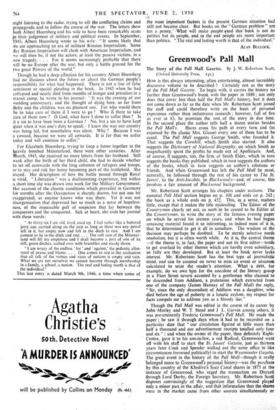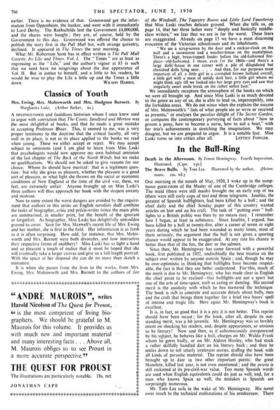Greenwood's Pall Mall
The Story of the Pall. Mall Gazette. By J. W. Robertson Scott. (Oxford University Press. 25s.) How is this always interesting, often entertaining, almost incredibly discursive volume to be described ? Certainly not as the story of the Pall Mall Gazette. To begin with, it carries the history no further than Greenwood's break with the paper in 1880 ; not only does that cover less than half the Pall Mall's history, but it does not come down as far as the date when Mr. Robertson Scott joined the staff and could therefore write on the basis of personal experience rather than industrious research ; however, full of fire as ever at 83, he promises the rest,,of the story in due time. In the second place the author tells half a dozen stories besides the Pall Mall's. Hares cross his path at every turn and (as enjoined by the classic Mrs. Glasse) every one of them has to be cased. The Pall Mall suggests George Smith, who founded it. That suggests the Cornhill, which, Smith also started. It also suggests the Dictionary of NationalBiography, on which Smith so magnificently spent the profits he made out of Apollinaris. And, of course, it' suggests, WO, the firm of Smith Elder, which in turn suggests the-books they published, which in turn suggests the authors of the books, which in turn suggests an author's relations or friends. And when Greenwood has left the Pall Mall he must, naturally, be followed through the rest of his career to The St. James', to the Anti-Jacobin, to Blackwood's—and, of course, this involves a fair amount of Blackwood background.
Mr. Robertson Scott arranges his chapters under sections. The essential Pall Mall section begins on p. 108 and ends on p. 242 ; the book as a whole ends on p. 452. This, in a sense, matters little, except that it makes the title misleading. The Editor of the Countryman clearly set out, as soon as he ceased to be Editor of the Countryman, to write the story of the famous evening paper on which he served for sixteen years, and when he had begun amassing material found it so interesting, as indeed most of it is, that he determined to get it all in somehow. The wisdom of the decision may perhaps be doubted. To be sternly selective needs resolution, but it is often worth while. As it is, the central theme —if the theme is, in fact, the paper and not its first editor—tends to get overlaid by other themes which are hardly even subsidiary, so fully are they developed. But at least the book never lacks interest. Mr. Robertson Scott has the best type of journalistic mind, and can be counted on never to miss an event or situation calculated to seize the reader's attention. What a debt, fok example, do we owe him for the anecdote of the literary group in a Fleet Street tavern accosted by a gentleman who claimed to be descended from Addison, a pretension which extracted from one of the company (James Hannay of the Pall Mall) the reply, " Sir, since the only descendant of Addison was a daughter., who died before the age of puberty in a lunatic asylum, my respect for facts compels me to address you as a bloody liar."
Though the Pall Mall was edited in the course of its career by John 'Morley and W. T. Stead and J L. Garvin among others, it was pre-eminently Frederic Greenwood's Pall Mall. He made the paper ; he saw it through days when it had to be recorded on a particular date that " our circulation figured at little more than half a thousand and our advertisement receipts totalled only four and six " ; and when the owner of the, paper, then definitely Right- Centre, gave it to his son-in-law, a red Radical, Greenwood went off with his staff to start the St,.. James' Gazette, just as thirteen years later Cook and Spender walked out the same office in like circumstances (reversed politically) to start the Westminster Gazette. The great event in the history of. the Pall Mall—though it really belonged more to Greenwood's personal history—was the purchase by this country of the Khedive's Suei Canal shares in 1875 at the instance of Greenwood, who urged the transaction on Disraeli through Lord Derby, the Foreign Secretary. Mr. Robertson Scott disposes convincingly of the suggestion that Greenwood played only a minor part in'the affair, and th4t infoimation that the shares were -in the market came from other sources simultaneously or
earlier. There is no evidence of that. Greenwood got _the infor- mation from Oppenheim, the banker, and went with it immediately to Lord Derby. The Rothschilds lent the Government £4,000,000, and the shares were bought ; they are, of course, held by the Government to this day. Greenwood was offered the chance to publish the story first in the Pall Mall but, with strange quixotry, declined. It appeared in The Times the next morning.
What Mr. Robertson Scott has in effect written is The Pall Mall Gazette, Its Life and Thnes, Vol. 1. The " Times " are at least as engrossing as the " Life," and the author's vigour at 83 is such that we need have no misgivings about the due appearance of Vol. II. But in justice to himself, and a little to his readers, he would be wise to play the Life a little up and the Times a little



































 Previous page
Previous page